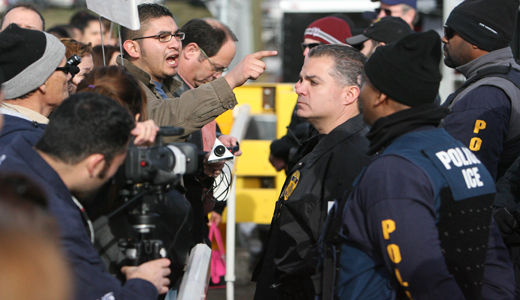
NEW HAVEN, Conn. – Josemaria Islas made a mistake last July. He went outside to eat his lunch.
Islas, a family man who had never been in trouble with the law and a devoted churchgoer, was “fingered” by an informant as a bicycle thief. New Haven police picked him up – and because the 8-year resident is Hispanic, they turned him over to the federal Immigration and Customs Enforcement Service (ICE).
Islas is innocent, police later found. The charges against him were dumped four months after his arrest. But he hasn’t been seen since the police took him away. ICE is still holding him in detention, and nobody knows where. The agency isn’t telling, either.
Islas’ family is frantic. His pastor is upset. And John Olsen, the Connecticut AFL-CIO president, is steamed. He’s the latest in a line of local officials – including New Haven’s mayor – to demand that ICE let Islas go.
But the agency won’t. It’s an “injustice and an outrage,” says Olsen, who protested to ICE’s Office of Public Advocate in D.C.
The catch, however, according to a new report from the National Employment Law Project (NELP), is that what ICE did to Islas is common – just as common as it was under the GOP Bush government, when ICE developed a reputation for workplace raids, hunting for Hispanics, especially during union organizing drives.
“Employers and their agents have far too frequently shown they will use immigration status as a tool against labor organizing campaigns and worker claims,” NELP’s report, Workers Rights On ICE, released Feb. 26, says.
Not only that, but ICE has unlimited powers to detain workers, like Islas, without trial and strictly on suspicion that they’re undocumented, criminals, or both. The result: At least 111,000 workers disappeared that way last year alone.
A survey of 4,000 undocumented workers in the nation’s three largest cities, New York, Chicago and Los Angeles, found that 43 percent of those who complained about working conditions or tried to organize their colleagues were targets of ICE, the report says. And the federal Equal Employment Opportunities Commission fielded 43,000 workplace discrimination and harassment complaints last year. Many involved retaliation against complaining workers.
That’s one difference between Islas’ case and many of the other people ICE targets, the report adds: Agents often pursue workers who stand up for themselves. All Islas was doing was eating his lunch. But the report teems with detailed examples of what happened in other ICE cases:
- ICE interference right as workers were trying to organize and join unions. The report cited four notorious examples: Palermo Pizza in Milwaukee, the Mi Pueblo supermarket chain in the San Francisco Bay area, the Case Farms chicken plant in Winesburg, Ohio – where company retaliation via ICE began after the United Food and Commercial Workers local there won recognition – and Pomona (Calif.) College.
- A Seattle contractor, identified as a “repeat offender” in wage theft, refused to pay three Latino construction workers some $33,000 it owed. Advised by attorneys for a workers center, the three complained to state officials in Feb. 2012. The company threatened them with deportation and ICE showed up at one worker’s house. He’s gone into hiding, NELP says. The other two, terrified, dropped their wage complaint.
- Winnetka, Calif., day laborer Hector Nolasco faces deportation because he worked for six hours and got paid for only five. Last month, Nolasco and a friend were hired to cut, pack and move boxes at a restaurant. The boss shorted them an hour’s pay, saying he hired them only for five hours’ work. Then the boss called the police, who arrested Nolasco for “threats with a dangerous weapon”-the box cutter. The charge is false, says Nolasco’s friend, who was present the whole time. Meanwhile, Nolasco stays in police custody and ICE plans to hold him after that.
- Former Lonett, Ala., restaurant worker Pablo Gutierrez – a pseudonym-toiled from 8 a.m.-10 p.m., seven days a week, never got paid overtime and earned, gross, $1,300 a month, about $3.50 hourly. Then his employer didn’t pay him for two months.
When Gutierrez walked in to demand his wages last September, the owner fired him on the spot, but told him to come back for his pay on Saturday, Oct. 6. Gutierrez did, but the boss called police instead – and charged Gutierrez with attempted robbery. “After spending almost two months in jail and immigration detention, Gutierrez was deported to Mexico on Nov. 26,” NELP reports. He still hasn’t been paid, either.
- Jose Martinez – another pseudonym – a landscaper in Spring Valley, N.Y., injured his hand on the job. He filed a workers’ comp claim and his employer fired him. On the way to his workers’ comp hearing, police, at ICE behest, pulled Martinez over and arrested him on criminal charges, based on a trumped-up employer complaint.
- “In the Deep South, a group of immigrant workers are facing deportation solely because they are defending labor and civil rights. The Southern 32 exposed ICE’s refusal to offer workers protections when enforcement actions block worker organizing on construction sites and day labor corners,” the report says.
- “A company in Ohio, on the eve of a National Labor Relations Board decision finding it guilty of several unfair labor practices, carries out its threats to ‘take out’ union leadership by re-verifying union leaders’ eligibility to work in the United States.”
All this ICE action against workers comes as Congress ponders immigration reform, with “increased enforcement” supposed to be part of any comprehensive solution. But such increased enforcement, if it’s selective and based on skin color or name, hurts workers as individuals, as potential unionists and as a class, NELP states.
“Silencing or intimidating a large percentage of workers in any industry means that workers are hobbled in their efforts to protect and improve their jobs. As long as unscrupulous employers can exploit some low-wage workers with impunity, all low-wage workers suffer compromised employment protections and economic security,” NELP concludes. Law-abiding employers must compete on the low-wage road, it adds.
And law-abiding workers like Josemaria Islas just disappear.
“Actions of this kind contribute to the atmosphere of fear which drives many good working people into the underground economy that undermines wages and standards for all,” Olsen concludes in his letter to ICE. Such abuses have to stop, he said.
Photo: Relatives of immigrant meat plant workers face off against police after a raid. The raids like this one that took place in 2006 under the Bush administration were seen as attempts to thwart unionizing. The ICE actions in Connecticut, activists say, also have the aim of punishing workers who speak out against injustice. Ahmad Terry/AP, Rocky Mountain News

MOST POPULAR TODAY

‘Warning! This product supports genocide’: Michigan group aims to educate consumers

After months of denial, U.S. admits to running Ukraine biolabs

Ohio: Franklin County treasurer attends Netanyahu meeting, steps up Israel Bond purchases

“Trail of Tears Walk” commemorates Native Americans’ forced removal

Hold the communism, please: SFMOMA’s Diego Rivera exhibit downplays artist’s radical politics






Comments